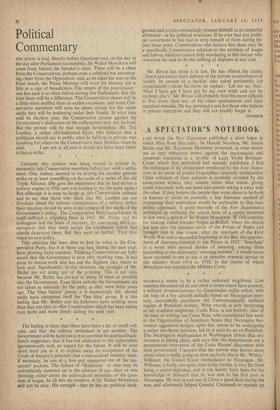Commentary
THE SCENE is laid. Shortly before Questions end, on the day or the day after Parliament reassembles, Sir Walter Monckton will come from behind the Speaker's chair. There will be a cheer from the Conservatives, perhaps even a subdued but encourag- ing cheer from the Opposition; and,. as he takes his seat on the front bench, the Prime Minister will wave his hearing aid at him as a sign of benediction. The return of the peacemaker : one has seen it so often before during this Parliament. But this time there will be a difference. The Conservative cheers will be a little more muffled than on earlier occasions; and some Con- . servative members will even be silent, except for the secret oaths they will be muttering under their breath. In what may well be election year, the Conservative protest against the Government's abdication to the railwaymen may not be loud.
But the protest will be real enough nevertheless. Mr. Ted Leather, a rather old-fashioned figure who believes that a politician should say in public what he believes in private, was speaking for others on the Conservative back benches when he said : `. . . I am not at all sure it would not have been better to face a strike.'
*
Certainly this opinion was being voiced in private by eminently safe Conservative members before last week's settle- ment. One, indeed, seemed to be hoping for another general strike or at least something on the scale of a strike of the old Triple Alliance. (He gave the impression that he had driven a railway engine in 1926 and was longing to try his hand again.) But although it is easy to laugh at this Conservative attitude and to say that those who think like Mr. Leather are too frivolous about the serious consequences of a railway strike. their reaction should be seen in the context of the whole of the Government's policy. The Conservative Party's-confidence in itself suffered a crippling blow in 1945. Mr. Butler and his colleagues laid the ,basis of ,recovery, by convincing the Con- servatives that they must accept the revolution which had almd8t destroyed them. But they went no farther. They pro- vided no new policy. This criticism has been slow to find its voice in the Con- servative Party, but it is there and has, during the past year, been growing more insistent. Thinking Conservatives are fully aware that the Government is now only marking time. It has done its rescue work and has not the slightest idea where to look next. Significantly,' in this situation, the protégés of Mr. Butler are not doing any of the pointing. This is not only because Mr. Butler has packed as many of them as possible into the Government. Even those outside the Government are not taken as seriously by the party as they were three years ago. The 'One Nation' group, it is increasingly felt, should really have christened itself the 'One Idea' group. It is this feeling that Mr. Butler and his followers have nothing more than that one idea to offer Conservatism which 114s been taking root more and more .firmly during the past year.
* * *
The feeling is there that there have been a lot of small sell- outs, and that the railway settlement is yet another. The Government will be hard put to it to convince its sceptical back- bench supporters that it has not abdicated to the railwaymen ignominiously with no regard for the future. It will be even more hard put to it to explain away its acceptance of the Court of Inquiry's principle that a nationalised industry must. if necessary, be run at a loss and supported out of the tax- payers' pockets. The failure of "Butlerism" to date may be conveniently summed up in the absence of any dear or new thinking, either about the nationalised industries of the ques- tion of wages. In all this the position of Sir Walter Monckton will not be easy. His strength—that he has no political back- ground and so can convincingly present himself as an impartial arbitrator—is his political weakness. If he ever had any politi- cal convictions he has had to strip himself of them during the past three years. Conservatives who believe that there may be a specifically Conservative solution' to the problem of wages and labour relations cannot help wondering at this lawyer who conceives his task to be the settling of disputes at any cost.
*
Mr. Bevan has done it at last. He has offered, the classic Liberal and laissez-faire defence of the private accumulation of wealth. In answer to a heckler who asked pertinently (or impertinently) about his farm, he replied : 'Let me say this : What I have got I have got by my own work and not by anybody else's.' Mr. Bevan will probably find this more difficult to live down than any of his 'other spontaneous and later regretted remarks. He has provided a text for those who believe in private enterprise and they will not readily forget it. TRIMMER


































 Previous page
Previous page